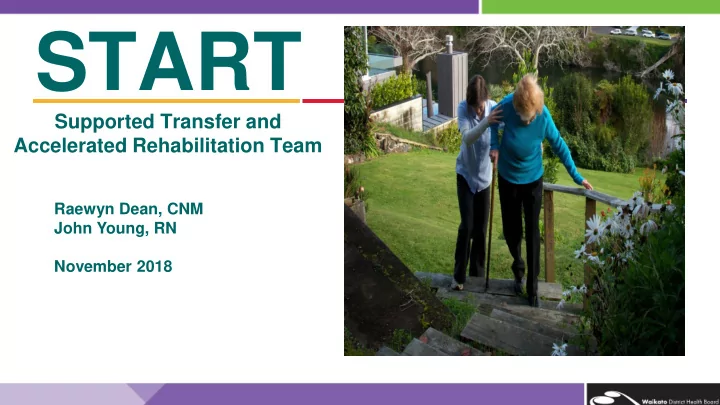

START Supported Transfer and Accelerated Rehabilitation Team Raewyn Dean, CNM John Young, RN November 2018
So what is START? Community-based, intensive rehabilitation program for the over 65 year old (except stroke) With the service for up to 6 weeks (usually 4 weeks) Provides an interdisciplinary approach with a team of: Health Care Assistants Physiotherapists Registered Nurses Occupational Therapists Geriatrician Administrator
Thames Hospital Waikato Hospital Tokoroa Hospital Te Kuiti Hospital Taumarunui Hospital
Criteria Domicile in the Waikato DHB area Discharged from a Waikato DHB hospital or ED 65 years and over (or under 65 if stroke) An acute illness Reduced level of function Potential for partial or complete recovery Home safe for rehabilitation Can transfer safely and doesn’t require assistance nocte Rehab goals and agree to participate Service needs not covered under another funding stream Doesn’t have a progressive disease or palliative Not been discharged from hospital for more than 48 hrs
Service Delivery Models The aim of START is to: • support earlier discharges • prevent hospital admissions (ED) • prevent readmissions
Service Delivery Models Hamilton Team - 62 patients Cambridge Team - 40 patients Thames Team - 25 patients Tokoroa - 10 patients Taumarunui - 10 patients
What can START provide? 7 day a week service Hours 0700hrs – 2100hrs RN’s available (on duty/on call) 0700 -2100hrs Up to 4 visits a day Programme is developed with the PATIENT and the input of all health disciplines Goals are based on: ‘ What is important to you? ’
Discharge InterRAI assessed GP discharge letter Reinstate existing or new/additional supports with DSL (NASC), ACC, Acute Home Support Aged residential care No services Referred on for on going therapy
Types of Rehabilitation Meal preparation Personal care Housework Shopping Medication oversight Exercise (strength, balance, upper limb, endurance, breathing and individual plans) Cognitive exercises Speech language exercises Self management (catheter care, BGL/insulin, daily weighs, COPD) Socialisation Transport
The Role of the START Health Care Assistant
An IDT Approach
Case Study 1: Mr J Mr J 64 year old, fit, well, lives with wife, still working Stroke: Basilar thrombus. Successful thrombolysis and clot retrieval. Ongoing ataxia requiring assist x 2, dysarthria and expressive aphasia. Into Hospital level care For 6 months Wanted to return home – Referred to START from DSL (NASC)
Case Study 1 What is important? To communicate well, to be as independent as possible. Outcome: Aimed completion Achieved/ What is important whilst with START date Not achieved Sign/ date Mr J will shower independently A Mr J will improve his mobility A Mr J will make his lunch daily A Mr J will improve his communication A
Goal: Hygiene Case Study 1 Healthcare assistant to assist with shower on Monday, Tuesday, Wednesday, Thursday, and Friday and to assist with dressing. To tidy the bathroom afterwards Task For Occupational Therapist review of safety and independence in shower Task Alerts: Goal: Exercise Healthcare assistant to coach/supervise exercises daily Needs fluids thickened, soft Task Physiotherapist to review, advise on aids and amend exercises as needed Task foods No weekend visits Goal: Meals Healthcare assistant to assist client to make lunch at their morning visit AM visit to be around 10 AM Task Healthcare assistant to assist client to make hot drink (with thickener) at their morning visit PM visit to be around 2 PM Task Occupational Therapist to conduct kitchen assessment and recommend appropriate strategies Task Goal: Cognition/memory/speech Occupational Therapist to conduct appropriate cognitive assessments and develop, review and update cognitive training programmes as appropriate Task Healthcare assistant to supervise speech-language exercises as prescribed by ward or outpatient Speech Language Therapist Task
Case Study 2 Mrs N Mrs B is a lady who lives alone in Cambridge, usually independent. Mrs B had a stroke, ended up with an IDC, poor balance, cognitive decline When assessed in hospital walk assistance of 1 with a Zimmer frame She was rest home level of care, but wanted to try home.
Case Study 2 Nephew stayed for a week until she was independently mobile START 4 times per day for: - Personal cares - Medication oversight - IDC cares (including emptying) - Meal prep (and fluids) - Exercises
Case Study 2 Independently dressing and undressing Simple meal prep and MOW Mobilising with a stick IDC out (and assessed for long term pad supply) Discharged with 3 showers per week, and home help
Questions Flexigran
Recommend
More recommend